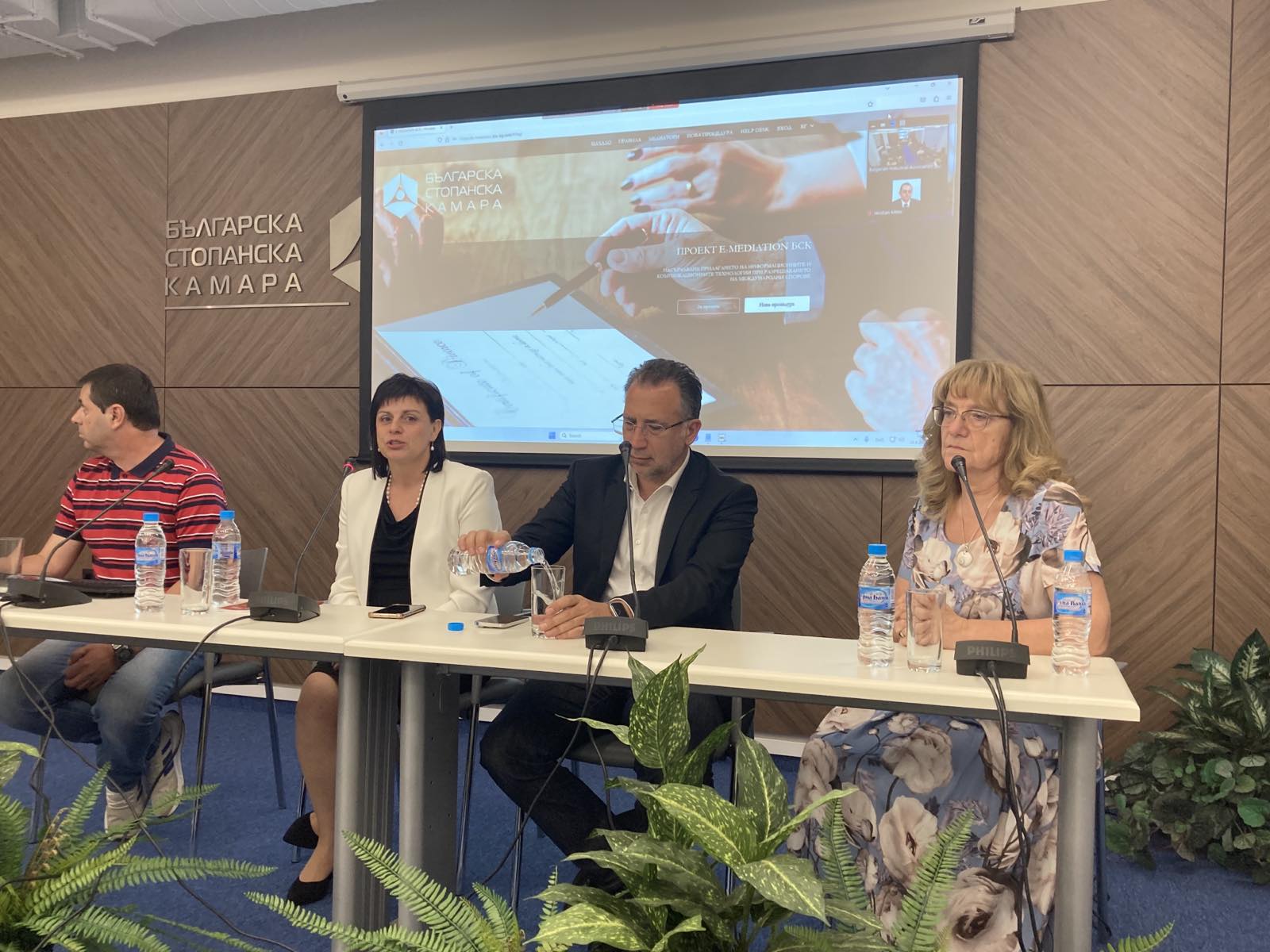An online platform for e-mediation was presented at BIA. In the event, which was moderated by the Chair of the Court of Arbitration at BIA - prof. Tanya Yossifova, was attended by representatives of interested parties - law firms and commercial companies. The platform was built in partnership with the Law and Internet Foundation, a research centre that supports and implements its own research, programmes and projects in the field of legal, technological, economic and social issues related to the rapid penetration of information and communication technologies in both the public and private sectors.
A commercial dispute can be resolved through mediation, without going to court
Mediation is one of the methods of out-of-court dispute resolution, the aim of which is to help the parties reach a solution to their dispute by concluding an agreement with the help of mediator(s). Mediation allows the parties themselves to resolve their problem, protect their interests and preserve their relationship.
A mediator is a neutral person who participates in the procedure in order to assist the parties to a dispute to communicate better and more productively. His or her role is to guide the parties towards reconciling their differences and finding a common solution to the problem that is in the best interests of both disputants.
The mediation process ends with the signing of an agreement, which is enforceable once it has been approved by the relevant district court. The Mediation Act, which transposes a number of European Union Directives, applies. According to the law, the principles of mediation are: voluntariness and equality; neutrality and impartiality; confidentiality.
The e-platform makes the process accessible, cheap and convenient
The e-mediation platform will enable the development of the entire mediation proceedings in an electronic environment, without the physical presence of the parties. This will make the process more accessible, cheaper and more convenient.
E-mediation starts with an application by one or both parties and ends with a settlement. These processes occur online, and the platform follows the requirements for electronic identification, including electronic signatures, electronic seals and electronic authentication of the contents of documents at a given time, which guarantee the authenticity of documents.
The parties choose a mediator to represent them, and the choice is made in two ways - by explicitly indicating (selecting from a list of mediators) or by automated random generation of a mediator from the system. The proposed mediator should be approved by the parties, if not, the system generates a new random selection. If either party has doubts about the impartiality and neutrality of the mediator, the party has the possibility to stop the procedure by requesting the mediator's recusal.
The stages of the procedure follow the methodology for conducting a mediation in a physical environment, first by holding a general meeting, then individual meetings and finally a general closing meeting. These meetings will be carried out by videoconferencing. The mediator will ask each party for a date and time that is convenient for them and, based on their responses, will schedule a joint meeting.
Who can benefit from mediation?
Mediation can be used by any company that is involved in a commercial dispute with a counterparty. In this regard, lawyers recommend that commercial contracts include a mediation clause. A sample mediation clause included in the text of the contract: "If a dispute arises in the conclusion or performance of this contract, the parties agree to resolve the dispute with the assistance of mediator(s) from the BIA's AC in accordance with its rules before resorting to arbitration or judicial resolution of the dispute". If the parties have omitted to include such a clause in the contract and a dispute arises in relation to its performance, they may sign a supplemental agreement.
Prof. Yossifova: Our mission is to make companies more aware of the benefits of mediation
"The interest in mediation in our country is relatively low, primarily due to the lack of knowledge of the advantages of this method of resolving commercial disputes, while in Europe and worldwide things look quite different. The European legislator has long placed an emphasis on mediation in resolving commercial disputes, including between business users and providers of online platforms, where this method is particularly appropriate. Our mission and desire are to inform Bulgarian companies about the possibilities to easily, quickly and inexpensively overcome obstacles in their way when they have a misunderstanding with their counterparty", said Prof. Tanya Yossifova, President of the Arbitration Court at BIA. She added that she hoped the introduction of modern technology would make the mediation process even more competitive with the traditional court, and consequently - more sought after by companies.
Prof. Yossifova committed to the digitalization of the activities of the Court of Arbitration at the BIA to continue at an accelerated pace so that this form of commercial dispute resolution will be recognized by Bulgarian business as much more practical and less time-consuming. Professor. Yossifova reiterated the need to include arbitration clauses in commercial contracts in order to delegate jurisdiction to the AC at BIA to resolve disputes that may arise.









